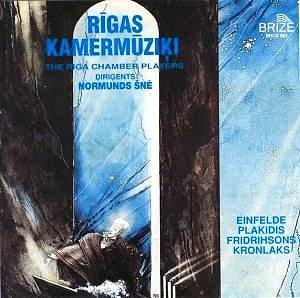Maija Einfelde was
a pupil of Jānis Ivanovs (whose symphonies are slowly being
issued by Campion). Her compositions have attracted international
prizes. Her chamber oratorio, At the edge of the earth
won the Barlow Competition in the USA in 1997. Three Sea
Songs is a work in which the dominant sound is that of the
string orchestra in full flight. Sometimes the work grates and
grinds in rhythmic violence related to The Rite of Spring.
At other times there is a modernised Sibelian tenderness accentuated
by the use of horn and oboe. The oboist is Uldis Urbāns;
the french horn player, Viesturs Vardaunis. Desolation and balm
balance each other but balm, albeit tinged with ambiguity, rounds
out this impressive single movement piece.
The sturdy-voiced yet mood-responsive mezzo in
the Plakidis work is familiar from
the Bis collection of works by Arturs Maskats (CD-1146). Antra
Bigača sings the three songs. Here she is recorded much more
closely than in Maskats' Salve. Her shaded voice
encompasses theatrical climaxes as well as inwardness. The string
writing is melodramatic and full of allusions linking with the
unbridled violent then exhausted sensuality of the poems by Astride
Ivaska. Imagine, as a parallel, the wilder excitement of the full
string orchestra in Finzi's Dies Natalis, small rushing
note-cells and the roughened surgingly majestic lyricism of Sibelius's
Luonnotar.
Plakidis was the teacher of Gustavs Fridrihsons,
the composer of the seven movement Kleine Passion for
string orchestra. The Riga Chamber Players are the dedicatees
of this work which relates to Bach's St John's Passion.
This is extremely dour, stern and restrained even in the musing
viola solo of Peter's Arioso (tr.7). On this
showing Fridrihsons is much more clearly in touch with Darmstadt
and Berg than the first two works on this disc.
Kronlaks is in much the same position
although his music has greater surface dazzle. Rushing incidents,
dissonance and discontinuity proclaim Kronlaks' uncompromising
credentials. These are traced through his academic training at
Enschede (David Rowland), Mexico City (Franco Donatoni) and IRCAM.
All in all this CD reflects two artistic streams
in Latvia's musical life. These are Einfelde and Plakidis speaking
for the lyrical and imaginative, accessible yet far from bland
and at the other extremity Fridrihsons and Kronlaks articulate
rites variously administered by Boulez, Henze and Frankel. Einfelde
and Plakidis were born in the 1930s and 1940s; Fridrihsons and
Kronlaks are children of the 1970s.
This is not the sort of disc you are that likely
to encounter outside Riga although
perhaps Records International could help. Alternatively please
contact me and I will put you in touch with the conductor Normunds
Šnē.
The booklet is in Latvian and English and is
thankfully fairly detailed. The font is rather slender but only
a moderate obstacle for those of us who are sight-challenged.
Rob Barnett
